High taxes do not necessarily mean the budget will collect more.
The Special Consumption Tax Law has a very broad impact, affecting all enterprises that produce, import, and trade goods and services subject to Special Consumption Tax. Therefore, recently there have been continuous seminars to gather opinions on this draft law.
Regarding the content of the draft law, the content that received many mixed opinions is that changing the tax calculation method, adjusting tax rates, and adding some items to the special consumption tax will affect Vietnamese branded products, reducing competitiveness with similar products with foreign brands.
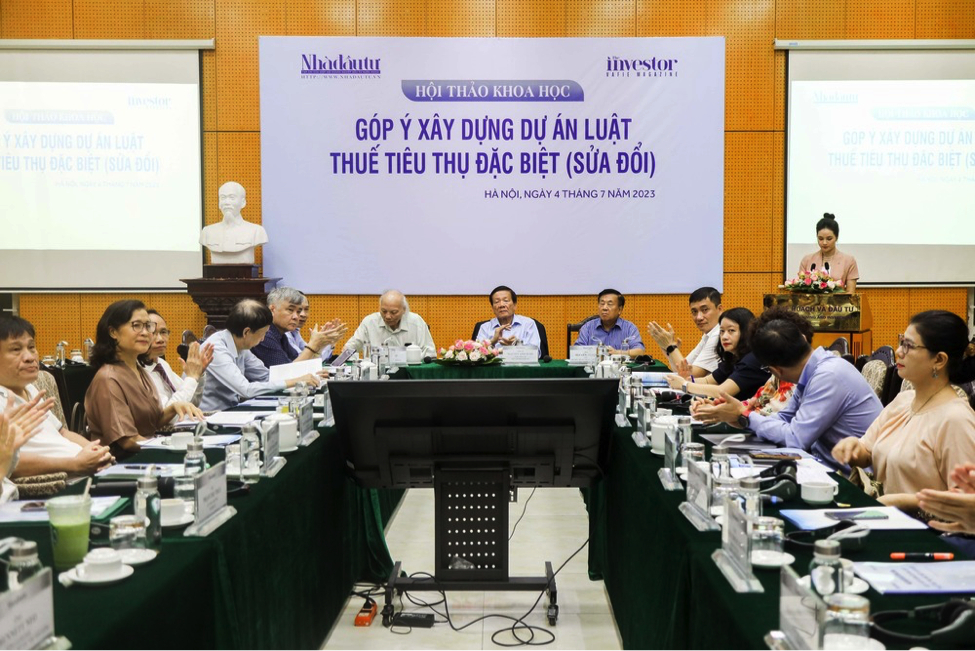
Scientific workshop "Contributions to the draft Law on Special Consumption Tax (amended)". Photo: Ha Linh.
Commenting on the draft law amendment, Associate Professor, Dr. Nguyen Van Viet - Chairman of the Vietnam Beer - Alcohol - Beverage Association (VBA) said: "The reform of tax policy needs to be researched, calculated scientifically and practically in Vietnam to ensure: Conformity with the current situation of production and business conditions of the industry in Vietnam; Transparency, with a clear, simple roadmap, feasibility; Harmonization of interests: State: regulating consumption, increasing budget revenue and nurturing sustainable revenue sources - Enterprises: not causing major impacts, creating stability - Consumers: protecting health".
For example, the draft proposes to increase special consumption tax on alcohol and beer to increase the selling price of alcohol and beer by at least 10% as recommended by the World Health Organization (WHO) and the roadmap to increase tax according to income growth and inflation. This is not the right time to increase tax.
The draft also proposes two methods for calculating taxes on alcohol. The first method currently applied is the relative tax, applying tax rates based on percentages. The second method is added as the absolute tax method and the mixed method (applying both percentage and absolute tax rates). The Ministry of Finance 's view is to continue applying the current relative method. However, there are opinions in favor of the second method.
"If tax rates increase or tax calculation methods change, businesses in the industry will be severely affected," said Mr. Viet.
Regarding taxable subjects, Mr. Viet suggested that "when there is not enough convincing scientific basis and the impact on the expansion of taxable subjects of special consumption tax has not been fully assessed, it is recommended to consider not adding sugary soft drinks, barley drinks and non-alcoholic soft drinks to the taxable subjects of special consumption tax".
At the workshop, senior expert on Tax and Corporate Governance - Mr. Nguyen Van Phung emphasized that after two years of the Covid-19 pandemic and the impact of the global economic crisis and recession, businesses and the economy are facing many difficulties.
“In this difficult period, in addition to the goal of regulating consumption, creating and stabilizing the state budget, policies and laws on special consumption tax need to act as a tool to support businesses to overcome difficulties, gradually restore production and business to create long-term sustainable development,” Mr. Phung stated his opinion.
Need to study both supply and demand carefully and deeply
Formerly Director of the Large Enterprise Tax Management Department (General Department of Taxation), former Deputy Director of the Tax Policy Department (Ministry of Finance), Mr. Phung supports the Ministry of Finance's viewpoint of maintaining the tax calculation method for alcohol.
According to Mr. Phung, if the tax calculation method is changed without a thorough assessment of the impact, it will affect the production and business capacity of Vietnamese beer companies and reduce the competitiveness of Vietnamese beer brands compared to foreign beer brands. At the same time, it will indirectly greatly affect the state budget revenue as well as the budget balance of localities because Vietnamese beer brands are being produced at local breweries across the country.
In the current conditions of Vietnam, it is not the right time to apply the mixed method or the absolute method, including in terms of state budget collection and tax management costs.
Sharing the same opinion with Mr. Phung, also supporting the method of calculating tax on alcohol and beer that the Ministry of Finance has chosen is Dr. Vo Tri Thanh - Director of the Institute for Brand and Competitiveness Strategy Research. He is the former Deputy Director of the Central Institute for Economic Management.
Dr. Vo Tri Thanh said that every type of tax and every method of calculating tax has its advantages and disadvantages, and high taxes do not necessarily benefit the budget. And if taxes are too high and affect production and business, budget revenue will also be affected.
Thanh's point of view is: The Government's policy is to find a balanced solution for the supply and demand of alcohol to ensure: Economic efficiency (resource allocation, competition); Social efficiency (meeting necessary, healthy needs but minimizing negative impacts); Budget revenue (a certain benefit of the state). However, this is a complex and not simple task, with many perspectives and noteworthy policy implications.
“This is also a valuable time to support businesses in restructuring production and improving competitiveness. We should carefully and deeply research supply and demand, market (segments) and socio-economic conditions of Vietnam, especially the process of implementing the country's development goals to 2030 and 2045, and different scenarios applying relative, mixed and absolute tax methods,” Mr. Thanh said.
Dr. Vo Tri Thanh said that the special consumption tax rate for beer and alcohol, especially beer, should not be adjusted until 2025. The relative special consumption tax rate may increase in 2026, by about 5-10%. It should be considered that around 2030, when Vietnam becomes a high-middle income country, the mixed special consumption tax method can be applied to beer and alcohol. Initially, it is possible to apply multiple levels of absolute tax rates depending on the product, whether it is a popular or high-end product, and adjust the relative tax rate.
Ha Linh
Source







![[Photo] Prime Minister Pham Minh Chinh launched a peak emulation campaign to achieve achievements in celebration of the 14th National Party Congress](https://vphoto.vietnam.vn/thumb/1200x675/vietnam/resource/IMAGE/2025/10/5/8869ec5cdbc740f58fbf2ae73f065076)
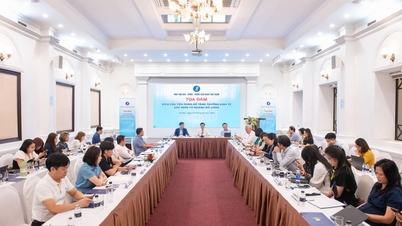



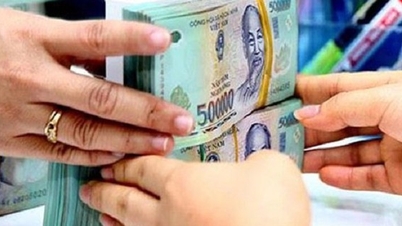












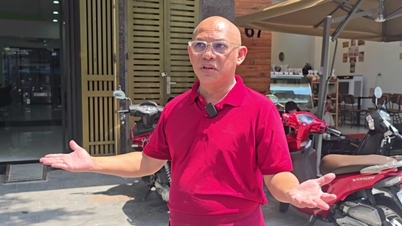










![[Photo] Bustling Mid-Autumn Festival at the Museum of Ethnology](https://vphoto.vietnam.vn/thumb/1200x675/vietnam/resource/IMAGE/2025/10/4/da8d5927734d4ca58e3eced14bc435a3)
























![[VIDEO] Summary of Petrovietnam's 50th Anniversary Ceremony](https://vphoto.vietnam.vn/thumb/402x226/vietnam/resource/IMAGE/2025/10/4/abe133bdb8114793a16d4fe3e5bd0f12)

![[VIDEO] GENERAL SECRETARY TO LAM AWARDS PETROVIETNAM 8 GOLDEN WORDS: "PIONEER - EXCELLENT - SUSTAINABLE - GLOBAL"](https://vphoto.vietnam.vn/thumb/402x226/vietnam/resource/IMAGE/2025/7/23/c2fdb48863e846cfa9fb8e6ea9cf44e7)













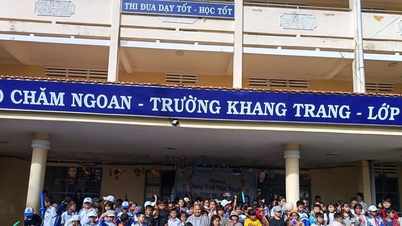



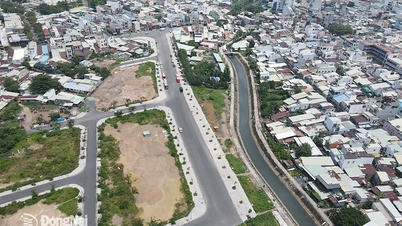


















Comment (0)